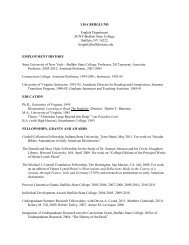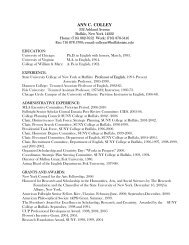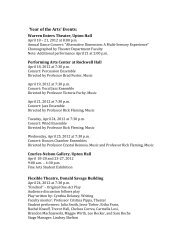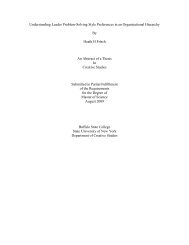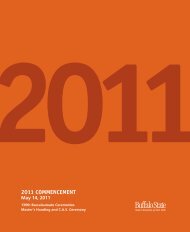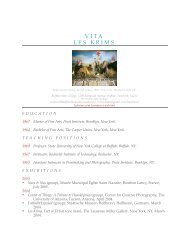POLITICS VERSUS SCIENCE: APPORTIONING ... - Buffalo State
POLITICS VERSUS SCIENCE: APPORTIONING ... - Buffalo State
POLITICS VERSUS SCIENCE: APPORTIONING ... - Buffalo State
You also want an ePaper? Increase the reach of your titles
YUMPU automatically turns print PDFs into web optimized ePapers that Google loves.
To these arguments we might add the Commission’s uncertainty over the long-run<br />
efficacy of divided competencies as expressed in the White Paper (2000d, item #40):<br />
As indicated earlier, the existing Treaty provisions impose constraints on the<br />
activities that can be attributed to the Authority, but this should not be taken to<br />
mean that a possible future extension of its competencies should be discounted.<br />
Such an extension should only be considered in the light of the experience with<br />
the functioning of the Authority and the confidence gained in its operation,<br />
including the possible need to change the Treaty.<br />
Our third question requires that we extrapolate beyond the food safety regime in<br />
asking us to evaluate food safety policy within the broader framework of regulatory<br />
governance in the European Union. Here the answer lies in the efficacy of policy<br />
networks. The European Commission reliance on networks is a neo-functionalism<br />
experiment in creating a Europe of people rather than a Europe of states. Whether this<br />
postnational vision of governance will provide the security and prosperity of the nation-<br />
state remains to be seen. This leads us directly into the fourth question: the expected<br />
impact of EU’s regulatory regime in the on-going construction of an international<br />
regulatory regime for safety. This is postnationalism writ large, the functionalism<br />
advocated in the interwar period and come to pass in the age of the WWW and jet travel.<br />
Yet it depends wholly on the success of a norms-based approach that conservatives<br />
dismiss as naïve and postmodernists as naïve as it is ethnocentric.<br />
Our final question asks whether the policy network approach can ensure food<br />
safety in an EU-25. Cosmopolitans have expressed reservations about the financial<br />
capacity of the CEECs to root out corruption and improve administrative capacities.<br />
Indeed, the European Commission (2002b) continues to warn the CEECs over<br />
unacceptably high levels of corruption. Despite the EU’s attempt to diffuse Western<br />
34




